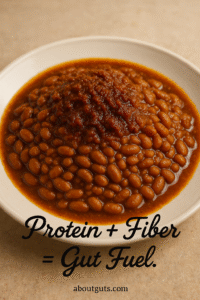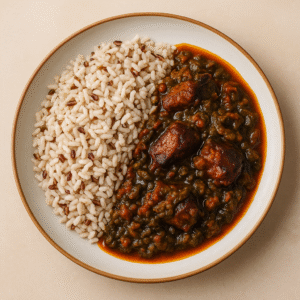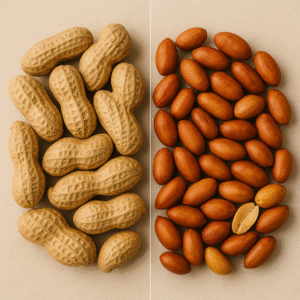Fibre is the unsung hero of gut health. It feeds the good bacteria in your digestive system, helps regulate bowel movements, lowers cholesterol, and even supports mental well-being. Yet, many Nigerians eat less than the recommended daily fibre intake. The good news? Our local foods are naturally rich in fibre—and affordable too. Here are 7 Nigerian staples that can transform your gut health.
Beans
-
Why it helps: Beans (ewa, brown beans, black-eyed peas) are fibre champions. They contain both soluble fibre (good for lowering cholesterol and feeding good bacteria) and insoluble fibre (adds bulk to stool).
-
How to enjoy: Ewa agoyin, beans porridge, moimoi, or akara (though steaming is better than frying).
-
Gut tip: To reduce bloating, soak beans before cooking to wash away some of the gas-producing compounds.

Ofada Rice (Local Brown Rice)
-
Why it helps: Unlike polished white rice, ofada rice retains its bran layer, which is packed with fibre and micronutrients. It helps stabilize blood sugar and keeps you full longer.
-
How to enjoy: Serve with ayamase (designer stew), vegetable sauces, or beans.
-
Gut tip: Rinse lightly but don’t over-wash, so you don’t lose fibre-rich bran.

Unripe Plantain
-
Why it helps: Rich in resistant starch, which acts like prebiotic fibre, feeding beneficial bacteria in your colon. It also slows digestion, keeping blood sugar levels stable.
-
How to enjoy: Boiled or roasted boli, unripe plantain porridge with vegetables.
-
Gut tip: Pair with groundnut or beans for a balanced gut-friendly meal.
Vegetables (Ugu, Ewedu, Okra, Bitterleaf, Spinach)
-
Why it helps: Leafy greens are loaded with insoluble fibre that supports regular bowel movement, while slimy vegetables like okra contain soluble fiber that soothes digestion.
-
How to enjoy: Vegetable soups (edikaikong, efo riro), okra soup, bitterleaf soup.
-
Gut tip: Avoid overcooking to preserve fiber content and micronutrients.
Sweet Potatoes
-
Why it helps: Packed with fibre, antioxidants, and slow-digesting carbs. The skin alone contains almost half the fibre, so don’t peel it all off.
-
How to enjoy: Boiled, roasted, or mashed. Pair with beans or vegetables.
-
Gut tip: Roast instead of deep frying to retain fiber benefits.
Millet (Fura, Tuo, Pap)
-
Why it helps: A traditional Nigerian grain, millet is gluten-free, rich in fibre, and supports stable energy release. When fermented (as in pap/ogi), it also introduces probiotics.
-
How to enjoy: Fura da nono, pap with akara, or tuwo with vegetable soups.
-
Gut tip: Choose whole-grain millet instead of overly processed pap for higher fibre content.
Groundnuts (Peanuts)
-
Why it helps: Not just protein, groundnuts provide prebiotic fibers that feed gut bacteria and improve satiety. They’re also budget-friendly.
-
How to enjoy: Roasted groundnuts with boli, sprinkled on pap, or groundnut soup.
-
Gut tip: Buy fresh to avoid aflatoxin contamination from mouldy storage.

Quick Swaps for More Fibre
-
Swap white bread → whole wheat bread
-
Swap white rice → ofada rice
-
Swap fried akara → steamed moimoi
-
Swap meat-only meals → add vegetables
-
Swap processed snacks → groundnuts or fruits
Fibre doesn’t just help you “go.” It is the foundation of a strong gut, resilient immunity, and long-term health. The beauty is, you don’t need imported supplements—Nigeria already offers affordable, fibre-rich foods. By making simple swaps and adding more of these 7 staples to your daily meals, your gut will thank you.
Track your fiber intake today with the AboutGuts Fiber Counter. Your gut bacteria will love you for it!
